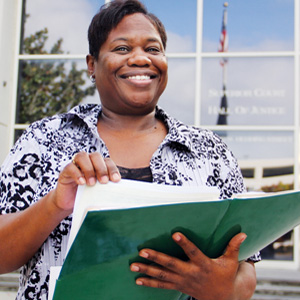Norma Burns knows hard times. Her adopted parents abused her as a child, and from the time she was 4 years old until she became an adult, she says, she was raped multiple times.
“No one protected me,” Burns says.
Following the worst of these incidents, Burns came home to California and joined the army. The service offered some stability, yet not long after she joined the army, she started drinking and smoking crack.
“I was living with this gentleman, and I was basically in an abusive relationship,” Burns recalls. “It just so happened in that particular night, him and I got into an argument, an altercation, and in my struggle in trying to get away, I scratched him right above his eyebrow, like as long as your fingernail.”
Police took pictures for evidence. She had no visible injuries, but her bodybuilder ex-boyfriend did. Burns, 53, was placed in jail for eight months and forced to take a year of domestic-violence classes. A couple years went by after the fraud and assault charges, and Burns started to take steps to put her life back together, visiting the Center for Employment Training (CET) in 2006.
“While I was going there I had a police record, and I had asked them, ‘For the field of work that I’m getting into, can I actually get into that field with a record?’ They said, ‘Well, down the line, we’re going to have students come in from San Jose State. We’re going start a program here, to implement a program, to get your record expunged.’
“That was the turning point in my life,” Burns says. “I knew that I needed to slow down and get my life together.”
Back to School
Peggy Stevenson started San Jose State University’s Record Clearance Project (RCP) in 2008. The program, believed to be the only one of its kind for college undergrads, is designed to give students hands-on experience assisting clients to clear their criminal records.
“It’s a hugely needed resource,” Stevenson says.
In its first five years, the program has held approximately 300 “speed screenings,” where trained students go through individual interviews to see what parts of a person’s record can be expunged.
Over the life of the program, Stevenson says, students have helped 151 clients file petitions in court to expunge criminal records or have felonies reduced to misdemeanors. In just this year, 133 petitions have been filed on behalf of 52 clients.
Before this process starts, though, Stevenson’s students take a course called “Practical Legal Skills.” They can then apply for an internship and conduct community education presentations at places like CET, drug court, Sacred Heart Community Services, Working Partnerships, Elmwood jail and Santee Community Center.
At its most recent speed-screening session, Stevenson says, 44 people showed up for consultations, lining up an hour early outside the building.
“We have a very long waiting list,” she admits. “I’ve been a little fearful [of publicity] because our capacity is quite limited.”
If not for the recent voter approval of sales and income tax increases in California through Proposition 30, CRP—which in May won the 2012 College of Applied Sciences and Arts Dean’s Award—probably wouldn’t be able to continue operations.
The program is currently searching for grants to help reach out to even more clients, who break down almost evenly by gender but more often tend to be of Latino descent (58 percent).
There are nonclearable offenses such as rape, incest and molestation of a minor. The main priority of RCP is to keep the community safe while helping reintegrate people into society. Stevenson says the next speed screening will be held in March or April.
Services are provided at no charge to clients, except for the rap sheet and some filing fees, but limited financial assistance is available if needed. Students prepare petitions, and the probation and public defender’s offices review forms prior to their submission to the judge. In the project’s brief history, Stevenson estimates, half of the students have applied for law enforcement positions, while about a third go into probation positions.
“Through seeing firsthand the impact of their legal work,” Stevenson adds, “some people begin to consider law school.”
Alanna Hayman, a SJSU senior and teaching assistant for the project, says the program’s benefits are mutually beneficial. “We go through every step with the client,” she says.Ê“We write the petitions, meet with the lawyer. We’re there with them in the courtroom. When everything is done and they come back to us and say, ‘You changed my life,’ I’m amazed. I can’t believe I changed someone’s life.”
The RCP’s next expungement hearing, which will be open to the public, takes place Tuesday, Nov. 27, from 3 to 5pm at San Jose’s Hall of Justice on Hedding Street.
Back to the Wall
Clients’ rap sheets vary, but the most common theme is drug addiction, which RCP says affects three-quarters of its clients.
Cheryl Lozano came from a single-parent home, where supervision was often lacking as relatives passed away and her mother worked odd jobs. She left the home when she was 12, and just a few weeks later, Lozano says, she was introduced to PCP. Her adolescent years quickly disintegrated into drug and alcohol abuse. In 1986, Lozano got a DUI while her child was in the car. She hit three parked cars and was charged with child endangerment. Luckily, no one was injured.
“I had friends that died from car accidents while smoking PCP, who’ve lost their minds, who are doing lengths of time,” says Lozano, now a volunteer for Angle Tree Ministry. She’s also been working with Stevenson and San Jose State by going to the jails, speaking with the men and women while working on getting her own child endangerment charge expunged.
The sole caretaker of her elderly mother, Lozano’s also working part-time for a conditioning company while going to school for her bachelor’s degree in sociology. She plans on becoming a social worker after she graduates.
“I believe what I’m walking through is what I’m supposed to go through, to be able to get to the victory on the other end,” Lozano says.
Back to Basics
Similar to Lozano, Burns had her record expunged with RCP’s help. She says she’s now in a positive relationship with a man who treats her right. In her free time, Burns volunteers to feed the homeless at community centers. “Life is so much better now,” she admits.
Burns is currently looking for employment after doing in-home care for an elderly woman the last 12 months. While finding a job remains difficult, she says the importance of RCP’s program to her prospects can’t be overstated.
“Having my record expunged has opened a lot of doors for me,” Burns says, “for employment, for credit, for housing; you know, for people to actually trust you again, ‘cause I feel like I’ve more than paid my debt to society. I did my time.
“God has truly blessed me to where my life is not a struggle anymore and I have peace. There’s nothing like peace.”

 Grub Shack: A Pacific Rim, Hawaiian Cuisine Fusion
Grub Shack: A Pacific Rim, Hawaiian Cuisine Fusion  Yeganeh Bakery in San Jose
Yeganeh Bakery in San Jose 


